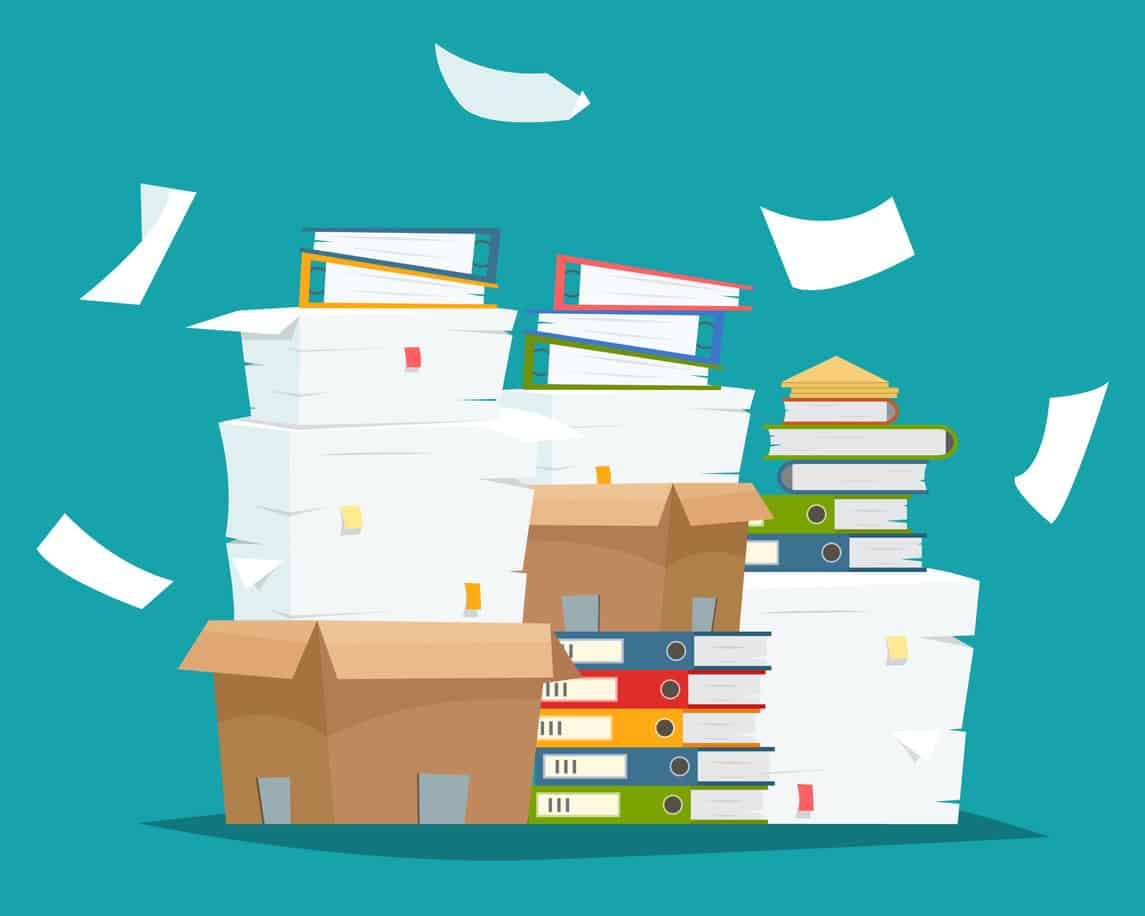
Paper is a problem for many people. For some it becomes a source of irritation as it comes in and requires them to make a decision. For others, it is a chore and a frustration because we’ve all been told not to waste paper. It almost seems to multiply overnight. I happen to like paper. I love to write and send nice cards to friends and family. And organizing paper, making sense of the piles is one of the organizing tasks I love to do. As we start the new year let’s create order by reducing the mounds of paper and making sense of the documents with these paper decluttering tips.
Paper Decluttering Tips
One of the main reasons paper accumulates is that we don’t know what to do with it. Another reason is that we don’t schedule time with ourselves to process the papers. So, the paper piles grow. An easy way to reduce the paper piles is to note the action you need to take on the top of the paper. So, if you don’t have time to process the paper right then, you will know (without reviewing the document again) what action to take when you do have time. The next step is to schedule time once a week to process papers.
What action do you need to take?
Here are some questions to ask yourself as you declutter and organize your papers.
- Is it something to pay?
- Can I pay it online or does it require a check?
- When is it due?
- Do I file it with vital documents?
- Does it replace a vital record I already have?
- Is it an update (insurance rider, updated will or healthcare proxy)?
- Is it something to shred because it contains sensitive information about me or my family?
- Do I need to keep this information forever in an archival file box?
Gather some supplies
If you have a shredder, bring it into the room where you are working on these papers if it isn’t already here.
Get some manila file folders, some hanging files, and some clear tabs.
You will also need a pen, pencil, or marker.
Begin with what you have
It’s always good to start from where you are.
Go through your existing files. Remove any documents that are either outdated or irrelevant and determine whether they can be recycled or shredded.
My rule of thumb for shredding is if the document has sensitive information like an account number, your social security number or any other identifier then shred it.
If it only contains your name and address, I recycle it.
Do a broad first sort
Take a stack of papers and pretend that you are dealing cards.
Try not to pay too much attention to the details on the paper, just look to see if it fits (broadly) into one of these categories:
Action Archive Household Personal Tax Vital Documents Recycle Shred
When you have finished dealing the stacks of papers into these broad categories go back to each individual pile and do a final sort.
You may decide under some of these broad categories to divide the pile into narrower sections. For instance, under ACTION you may have PAY, FILE, READ, RESPOND.
Within the ARCHIVE file you may want a section for volunteer activities or positions you held. It’s nice to have a record of these activities including the year, how long you participated, and the volunteer position you held. It can be useful information on a resume.
Also put the actual tax filing as well as the supporting documents in the TAX section of your ARCHIVE files.
The HOUSEHOLD file can contain names and phone numbers of service providers as well as maintenance records for appliances.
VITAL DOCUMENTS must be updated from time to time and the stack of papers may contain some updates. Be sure to shred anything you remove from these files. Here’s a list of Vital Documents for you to review.
Create new folders and files
Create a 2023 Tax file so that you have an automatic place to put anything tax related. This file should be easily accessible and not in the archive section of your files as you will be putting things into it as they arrive in the mail.
More Paper Decluttering Tips
If you do not already, take the time and investigate receiving bank statements and bills through your email. Most vendors and banks prefer to send electronic statements. It costs less for them, and they can be sure you receive the information.
If you want to have a paper copy you can always print it.
I find it easier to reconcile bank statements from a paper copy, but I receive my bank statements electronically.
Also, if you are concerned you may miss a bill because you get so much email, you can create notifications in your calendar to look in your email for certain bills or statements. This way they won’t get lost in the sea of emails that arrive in your computer.
Set a time limit on magazines and newspapers
Decide how long you will keep a magazine or newspaper before it gets recycled. Sometimes it takes a little while to read an entire magazine. Maybe you haven’t finished reading one before the next issue arrives in your mailbox. Set a time limit so that magazines don’t just accumulate.
You can also rip out the articles you want to read and put them in a folder.
Take the folder with you to the Dr. appointment or have the folder with you as you sit in the carpool line waiting to bring your children home and then recycle the article once you’ve read it.
Stop at the recycling bin on your way in your home
Here’s a final paper decluttering tip. Stop at the recycling bin on your way into your home. Deposit any flyers or circulars into the bin so that they never even make it into your home.
Finally, paper decluttering is difficult work. Each sheet of paper requires you to read it and make a decision. When you decide to begin this task do it in short amounts of time. Set a timer for 15 to 20 minutes. When the timer goes off, get up, and take a break. Get something to drink and maybe a snack. You can even take a short walk around the neighborhood. Then go back to the papers and work for another short segment of time. Give yourself permission to tackle this task a little at a time so that you make sound decisions and so that you don’t get overwhelmed.
If you want a little guidance, reach out to me. We can work on paper together in-person or virtually.
Diane N. Quintana is a Certified Professional Organizer® ,a Certified Professional Organizer in Chronic Disorganization®, Master Trainer and owner of DNQ Solutions, LLC and co-owner of Release●Repurpose●Reorganize, LLC based in Atlanta, Georgia.

